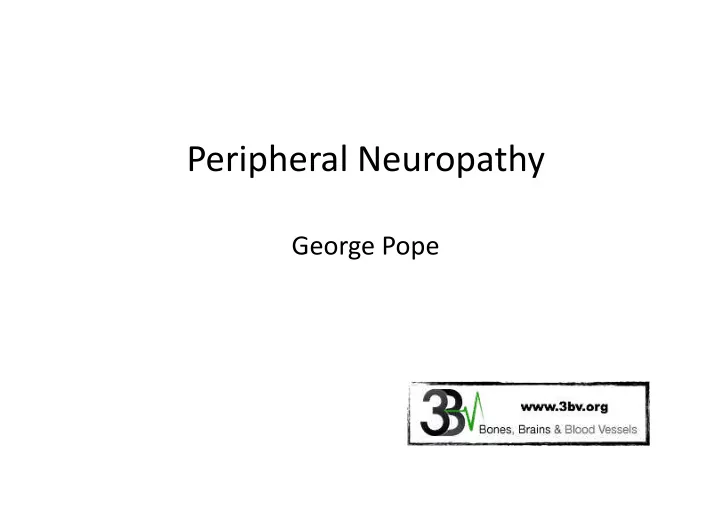

Peripheral Neuropathy George Pope
Presenta3on of neuropathy and ae3ology Neurophys Acute Subacute Chronic Distal Symmet : Axonal Toxins Systemic dise. As subac. Porphyria Def. States HMSN 2 Toxins Cancer assoc Amyloid Demylina-ng GBS CIDP HMSN 1 Diphtheria CIDP ‐‐‐‐‐‐‐‐‐‐‐‐‐‐‐‐‐‐‐‐‐‐‐‐‐‐‐‐‐‐‐‐‐‐‐‐‐‐‐‐‐‐‐‐‐‐‐‐‐‐‐‐‐‐‐‐‐‐‐‐‐‐‐‐‐‐‐‐‐‐ Mul8focal + Axonal Vasculi3s Diabetes Leprosy mononeuri8s Sarcoid mul8plex Demylina-ng GBS CIDP CIDP
Peripheral neuropathy • Classifica3on • Causes • Presenta3on • Inves3ga3ons • GBS
Classifica8on
Peripheral neuropathy Classifica3on 1 Axonal Demylina3ng Vascular Sensory/motor
Axonal • Axon lost • Glove + stocking sens.loss • Muscle weak/wasted • Longest axons most affected • Absent reflexes
Axonal neuropath causes • Diabetes • Neoplasms • Hypothyroid • Infec3on • Uraemia • HIV • Rheumatoid • HMSN • Lupus • Vascular neuropathies • Toxic • Vit.def
Demylina8ng • Myelin Sheath lost • Sparing pain +temp • º was3ng/weakness • Nerve enlargment • Absent reflexes
Classifica8on 2 • Gene3c • Metabolic/endocrine • Nutri3onal def • Toxic • Drug induced • Conec3ve 3ssue disease • Cancer related • Unknown (20%)
Toxins/Drugs distal sensorimotor symetrical peripheral neuropathy • Arsenic • Amiodorone • Cispla3num • Ethylene oxide • Dapsone • Lead (motor ) • Gold • Mercury • Isoniaside • Organophosphates • Metronidazole • Thallium • Thalidomide • Ethanol • Vincris3ne
Vitamin def Painfull,sensory,distal symet. axonal neuropathy • Pernicious anaemia(B 12 ) • Pellegra (niacin def.) • Pyridoxine def. (B 6 ) • Thiamine def. (B 1 ) • Folate def. • Vitamin E def.
Diabetes Most common in West 1) Distal Symmetrical 75 % Usually sensory +autonomic Painfull paraesthesia/numbness Neuropathic arthropathies 2)Asymmetrical prox. Neuropathy Diabe3c amyotrophy Lumbosacral radiculopathy 3)Autonomic 4)Neuropathies amd radiculopathies
Diabetes
Neoplasia Symmetrical distal sensorimotor axonal neuropathy • 1% pts with cancer • Types Nerve invasion‐‐lymphoma Malig. Meningi3s Paraneoplas3c‐‐symet.distal sensorimotor axonal neuropathy
Infec3ve neuropathies Leprosy Tuberculoid nerve thickening + mononeuri3s mul3plex Lepromatous Superficial sensory neuri3s/anaesthe3c depig skin Lyme Borrelia Burgdorferi
Vasculi3c Neuropathies Wegner’s granulomatosis (cANCA) Rheumatoid Arthri3s (Rh factor) Sjogren’s syndrome (An3‐Ro an3‐SS‐B) Polyarteri3s Nodosa Dx Histol.+suppor3ve serology Rx Immunosuppress.
Inves3ga3ons
Basic Inves3ga3ons • ESR • B 12 • FBC • Urinalysis • Ca • CXR • Crea3nine • Autoan3. • Fas3ng glucose • TFT’s • Plasma electroph.
Inves3ga3ons • NCS • LP • Toxins/Vitamin levels • HIV • Nerve bx. • ANS • Gene3c • ACE/ Urinary Ca
Nerve conduc3on studies
GBS Demylina3ng neuropathy • 1859 Landry described 10 cases of ascending paralysis and sensory changes • WW1 Guillain,Barre,Strohl described above + areflexia
Demylina3ng Neuropathies GBS/CIDP GBS Autoimmune process characterized by progressive weakness and mild sensory changes. All ages. 2 per 100,000 per yr. 70% antecedent infec3on Campylobacterjejuni CMV EBV
GBS Predom. motor polyradiculopathy Limbs + cranial nerves/mild sensory s+s Reflexes lost with 3me ANS ‐‐arrhythmias/Bp ↓↑ / urinary / bowe l progression (average 5 – 10 days)
Inves8ga8ons • CSF ‐ protein 200 – 600 mg/l ‐ cells: few or none • MRI ‐ cranial nerve enhancement may occur • Serum an3bodies CIDP ‐ IgG vs ganglioside GQ1b
Prognosis • 5 % mortality • 20 % con3nued disability at 1 yr • 3 % recurrance • Axonal =slower + less complete recovery
CIDP • GBS > 6 MTS • Rx steroids / Plasma exchange / Ig’s • May be assoc with monoclonal gammopathy of unknown significance
Miller‐Fisher Syndrome Variant of acute inflammatory demyelina3ng polyneuropathy Epidemiology • Onset: mean 40 years (13 – 78 yrs) • Clinical prodrome: usually respiratory • 1% of Guillain‐Barre Syndrome
Clinical Features Onset ‐ diplopia (80%) ‐ myalgia & paresthesias ‐ ver3go & ataxia Eye ‐ external ophthalmoplegia (100%) ‐ pupillary dysfunc3on (42%) ‐ ptosis (58%)
Ataxia (100%) Areflexia (100%) Sensory ‐ distal & facial parasthesias (24%) Weakness (20%) Other cranial nerve disorders ‐ oropharyngeal weakness (26%) ‐ facial weakness (32%)
Progression ‐ over days to weeks ‐ may progress to generalized weakness ‐ recovery over 2 weeks to 2 months ‐ many pa3ents with no residual defects long term.
Treatment Indica3ons for rapid treatment: • VC < 1 Lt • Respiratory dysfunc3on • Bulbar disorders • Inability to walk without assistance • ?milder weakness
Plasma exchange vs. IV Immunoglobulins overall no difference in efficacy Plasma exchange Immunoglobulins ↓ side‐effects ? Fewer late relapses ↓ cost / easy access/admin No allergic reac3ons Use Use Children Adults with good venous access Pts with History of S/Es with Igs ‐ diarrhoea prodrome Pregnancy ‐ infec3ous disorders (HIV) Conges3ve cardiac failure ‐ autonomic instability Renal insufficiency ‐ poor venous access
Rx. Complica3ons • Pneumonia • Complica3ons of ven3la3on • Pulmonary embolism • Corneal exposure • Dysphagia • Cardiac arrhythmias • Malnutri3on • Speech Rx ect.
References Asbury AK: Diagnos3c considera3ons in Guillain‐Barre syndrome. Ann Neurol 1981; 9 Suppl: 1‐5. Berlit P, Rakicky J: The Miller Fisher syndrome. Review of the literature. J Clin Neuroophthalmol 1992 Mar; 12(1): 57‐63. Chiba A, Kusunoki S, Obata H: Serum an3‐GQ1b IgG an3body is associated with ophthalmoplegia in Miller Fisher syndrome and Guillain‐Barre syndrome: clinical and immunohistochemical studies. Neurology 1993 Oct; 43(10): 1911‐7. Dwyer JM: Manipula3ng the immune system with immune globulin. N Engl J Med 1992 Jan 9; 326(2): 107‐16. Fisher M: An unusual variant of acute idiopathic polyneuri3s (syndrome of ophthalmoplegia, ataxia and areflexia). N Engl J Med 1956; 255: 57. Plasma Exchange/Sandoglobulin Guillain‐Barre Syndrome Trial Group: Randomized trial of plasma exchange, intravenous immunoglobulin, and combined treatments in Guillain‐Barre syndrome. Lancet 1997 Jan 25; 349(9047): 225‐30.
Recommend
More recommend